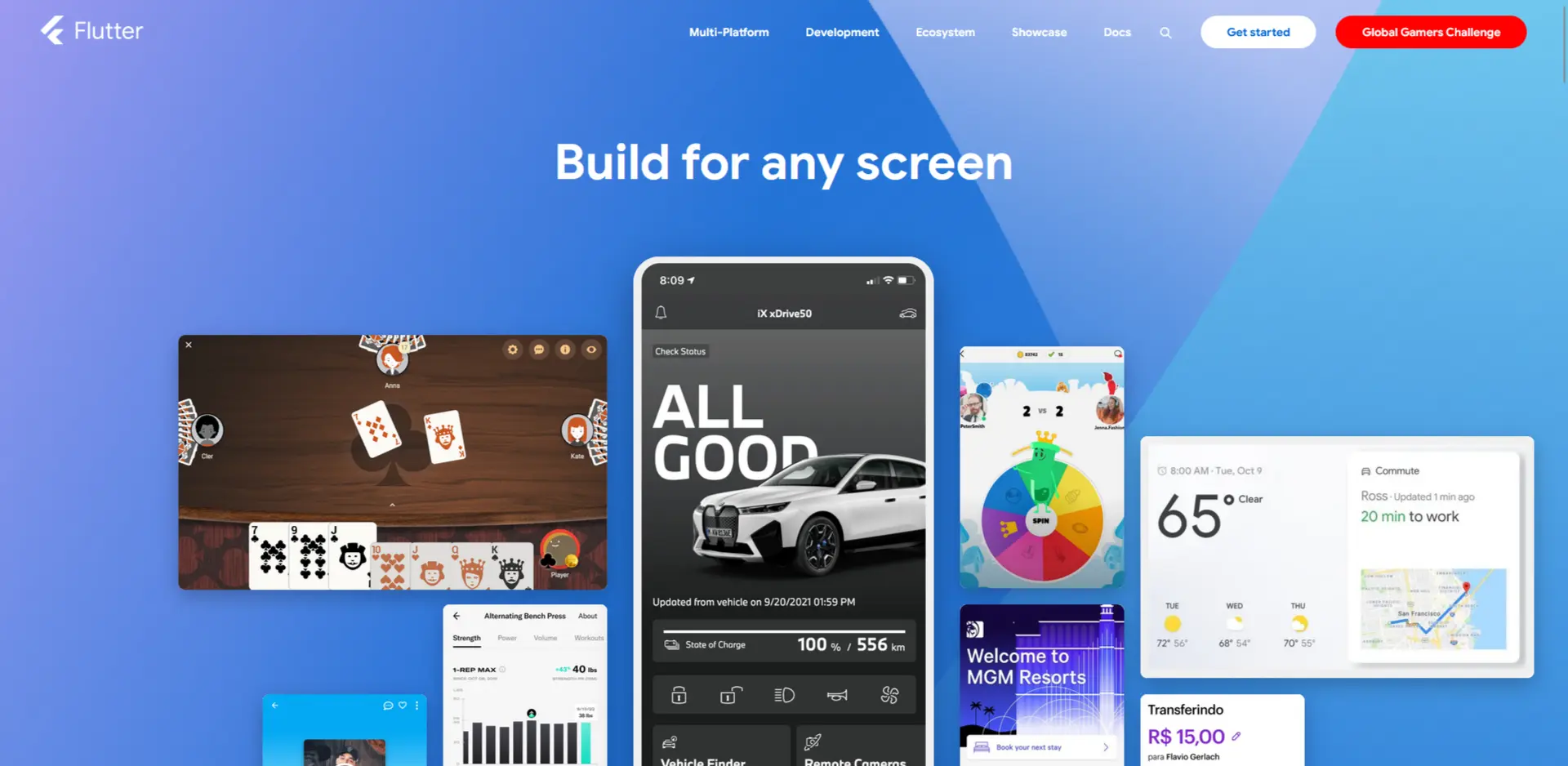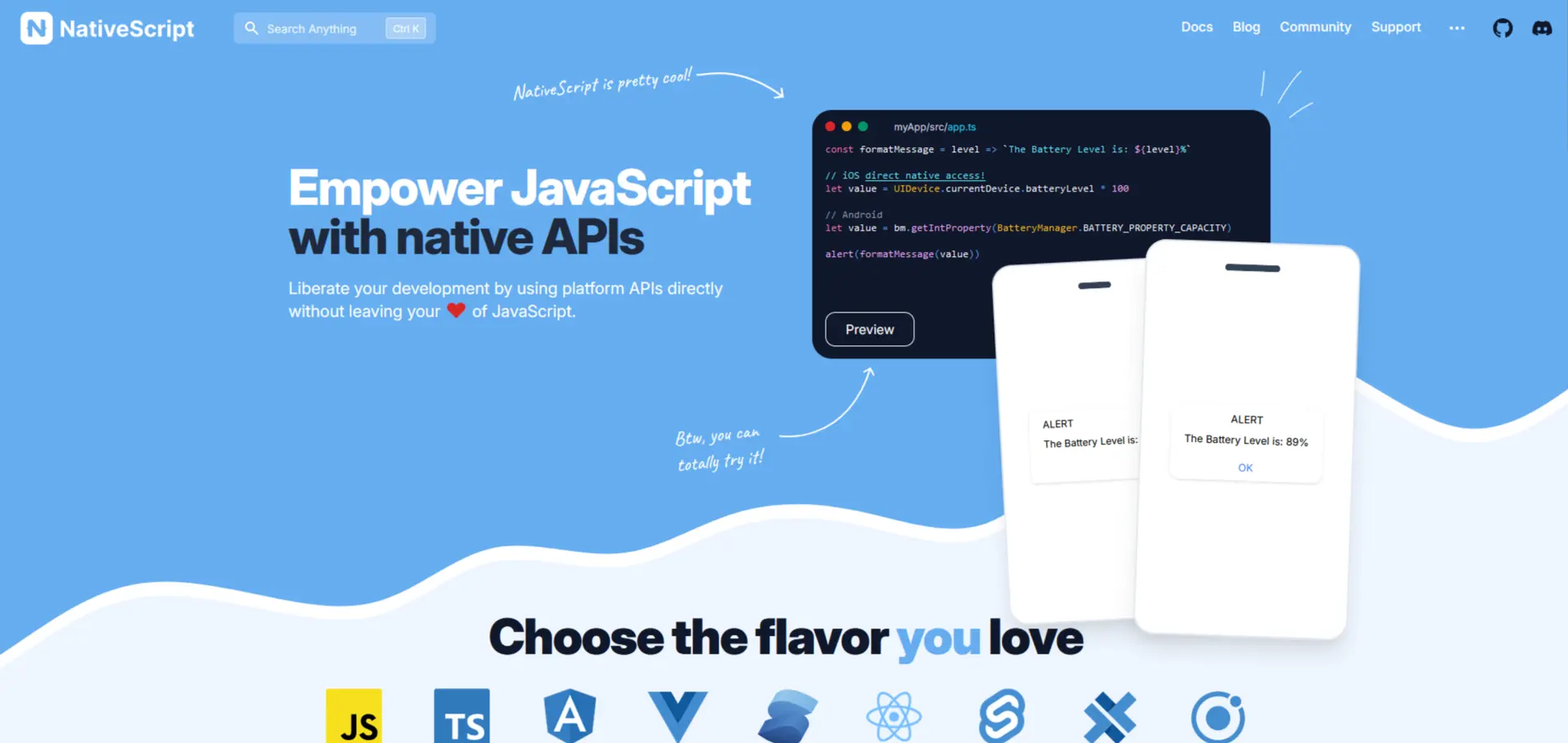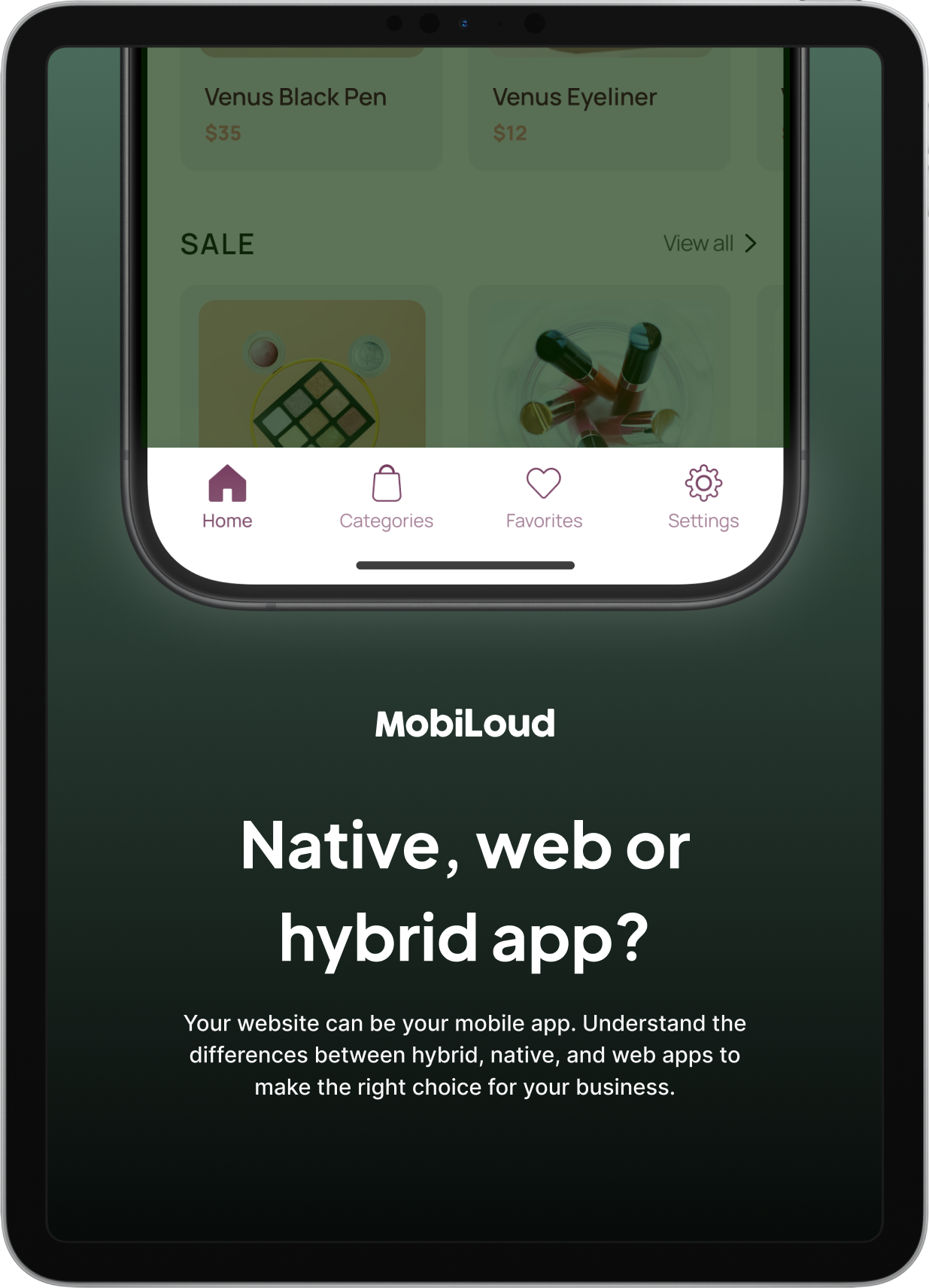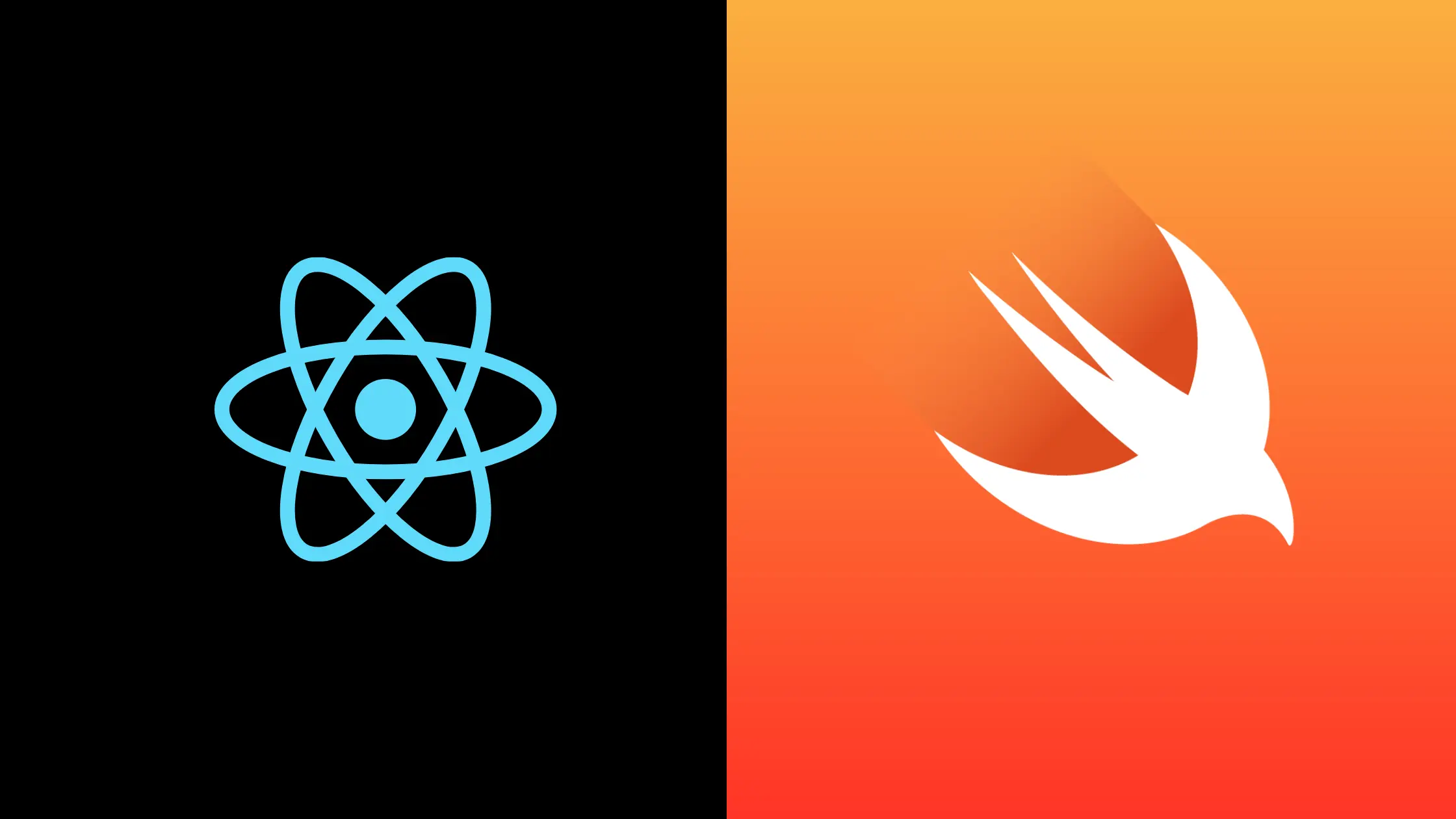The 6 Best Cross Platform App Development Tools in 2024
In this article, we'll discuss the best cross-platform app development tools, to help you build apps cheaper and faster, and with lower overhead.
In 2024, cross-platform is a much better option than native app development. Cross-platform mobile apps are 99% as good as native apps, and the amount of time, effort and money you save by building once and deploying on multiple platforms makes it a no-brainer.
Keep reading to learn the optimal tech stack to use for your cross-platform app.
Cross-Platform Development Tools: What You Need to Know
If you're familiar with cross-platform development, feel free to jump ahead and check out our list of the best cross-platform frameworks and development tools.
If you're still a little fuzzy on the topic, here's a primer for what you need to know about cross-platform mobile development and why you should consider it for your project.
Cross-platform versus native app development
A native app for Android or iOS is specifically built to run on that platform and cannot run on another without being rebuilt. For Android, that usually means the app was created with the Kotlin or Java programming languages, while on iOS, it is usually Objective-C or Swift.
Alternatively, cross-platform apps are built to run on either platform and use a framework that works on both. These apps are common, and some major apps are cross-platform, including Facebook, Instagram, and many others.
Cross-platform apps save you time and money
It takes a lot of work to build an app, and if you have to develop two separate apps to get everyone on board, you will end up duplicating code, work, and overhead. That is why major apps are cross-platform: you only have to do everything once.
That does mean cross-platform apps may not be quite as tightly integrated into Android or iOS as native apps, but that is usually not a significant concern. After all, have you ever noticed anything in the Facebook app, for example, that indicates it is not native? Most people won’t, and you usually do not need the slight increase in integration a native app provides.
Cross platform mobile apps and hybrid apps
Some of this terminology can get confusing because it sounds similar, but a hybrid app is only sometimes a cross-platform app or vice versa. A hybrid app is any app that can run mobile and web code at the same time, such as CSS, HTML, and JavaScript. These apps combine web code with a small amount of mobile app code to run on devices.
For example, a hybrid app may run using mobile code but then pull up an in-app browser window to show additional content. These apps tend to be a bit less efficient and functional than full cross-platform apps, but they allow you to get a mobile app built quickly and work well enough for many purposes.
Do note that other sources may use hybrid and cross-platform apps synonymously, so some of the items on this list are both.
The 6 Best Cross-Platform Frameworks and Development Tools in 2024
1. React Native
.webp)
React Native uses JavaScript to allow cross-platform development and then lets you tie them into native APIs. An application programming interface (API) allows for platforms and apps to talk to each other, such as Android to an app or the other way around. It lets you build Android, iOS, Windows, and the web apps.
React Native is from Meta (AKA Facebook), and it launched in 2015, so you can rely on it being around for a while. It has a good bit of support and use cases already built up. Some popular apps already use it, including the Facebook app, Skype, Microsoft Office, Discord, and many others.
Many apps tend to run with near-native performance when using React Native, and you get lots of pre-built bits and pieces to use. That way, you can get started quickly. It is also open source and community-supported, meaning you can usually find help or a guide to solve your problems or if you get stuck.
Furthermore, React Native apps tend to integrate well with their respective platforms, ensuring a consistent experience for everyone who uses your app.
Pros
- JavaScript-based
- Good platform integration
- Lets developers see their changes as they make them
Cons
- Doesn’t take a pre-existing website and let you build an app from it
- Not completely platform-agnostic—you may have to pull in native code to get something working
2. .NET MAUI (formerly Xamarin)

.NET MAUI is from Microsoft, and it uses C# and .NET to help you create apps for Android and iOS, plus Windows and macOS. That does mean you have to write your code in C# instead of HTML, CSS, and JavaScript, but in return, you get a tightly integrated app on each platform. .NET MAUI is the next evolution of Xamarin, which you may have already heard of. Apps using .NET MAUI or Xamarin include the UPS Mobile app, Microsoft’s Azure app, and NBC Sports Next.
If you have previously created a cross-platform app with Xamarin, you can migrate it to .NET MAUI without too much hassle. You will not have to rewrite anything, which is a plus.
You can use Visual Studio to create apps, which is already quite a popular way of building apps, so many developers are familiar with it. You may create totally multi-platform apps, but if required, you can insert native features for specific platforms.
Much like React Native, using .NET MAUI lets you create cross-platform apps. You may also share the user interface and design on each platform to help ensure consistent brand identity. It’s open source and community-supported, to boot.
Pros
- C# is easy to grasp and works across lots of platforms
- Visual Basic is already in use by many coders
Cons
- Can get expensive if you want full support and Visual Basic
- Visual consistency can be hard to maintain across platforms
- Doesn’t take a pre-existing website and let you build an app from it
3. Flutter

Google has an entry in the cross-platform app builder game with Flutter. It uses the Dart programming language and lets you build apps for devices using ARM or Intel processors, which includes Android, iOS, Windows, Linux, and macOS. Apps built with Flutter include the Alibaba app, Google Pay, Kijiji, and many others. It is open-source and community-supported as well.
One thing Flutter is known for is the ability to customize user interface elements to a high degree. That way, if you want your app to look and feel a certain way, it can. It will be consistent across screens and devices, too. If you don’t have design resources, Flutter includes plenty of ready-made components to get you on your feet fast.
You can also use hardware acceleration on multiple platforms, making your apps fast and responsive. Furthermore, Flutter apps can be more complex and involved compared to other cross-platform app development frameworks, which is handy if you need specialized features.
Pros
- Easy to create an app using already-included components
- Lots of handy example code and widgets at the ready
Cons
- Doesn’t take a pre-existing website and let you build an app from it
- App sizes can be rather large
4. Ionic
.webp)
Ionic is a cross-platform app builder that uses web languages and technology, including CSS, JavaScript, HTML, and mobile code, to let you build apps that work on Android, iOS, desktop, and the web. Apps built with Ionic include the Southwest Airlines app, the Instant Pot app, the Target app, and many others.
You can dip into the native features of various devices if needed, which helps optimize each app version you create. Pre-made UI bits and pieces also fit right in with multiple platforms, letting you streamline your app-building process.
However, if you want, you do not have to have a user interface built with Ionic to use Ionic components, which is excellent for flexibility and customization.
Pros
- App development tends to be quick
- Pre-built UI elements are handy
- You can track your progress in a web browser
Cons
- Testing an app using a web browser is tricky
- More complicated interfaces and visual elements may not work
- Doesn’t take a pre-existing website and let you build an app from it
5. NativeScript

NativeScript provides APIs for JavaScript that let you create cross-platform apps for iOS and Android. If you already use JavaScript for other things, it makes for an easy transition. It is open-source and community-supported. Some notable NativeScript apps include Aura CO2, the Dresden tourism app, and many others.
You can easily tie together native components with NativeScript without learning new code for each platform. This also means you can leverage device-specific features if you want.
Apps will have a consistent look and feel with their platform, and plenty of plugins are available to help you get the functionality you want. Furthermore, you can bring in other languages, such as Java or pieces of Objective C, for example.
Pros
- Makes it easy to build a cross-platform app using JavaScript
- Apps tend to feel and look quite well-integrated with their platforms
Cons
- Not used by as notable companies compared to some other options
- Requires some knowledge of Android and iOS features to produce the best results
- Doesn’t take a pre-existing website and let you build an app from it
6. MobiLoud

MobiLoud is not a framework per se, but instead, it lets you create hybrid apps that work across iOS and Android. You can turn any website into an app with a single codebase and no reduplication of work. Some apps using MobiLoud include Rainbow Apparel, Jack & Jones, Foreign Policy, Simple Flying, and many others.
Unlike the other options on this list, MobiLoud gives you consistency across your website and app without building anything from scratch. That includes mobile push notifications and full support for your website’s custom functionality.
Also, unlike the other options on this list, you get a working app out of the box after working with MobiLoud. Plus, a help and support team is there when you need it.
If you want to customize your app experience even more, you can do that. Plus, it works with various e-commerce solutions across platforms, including Shopify, Big Cartel, and many others. The look and feel of your app will be the same on each platform, too.
Pros
- No coding needed from yourself
- Works with your existing website and code
- Consistent look and feel across platforms
Cons
- Native device features could be hard to implement
Cross-Platform App Development Tools: The Bottom Line
Building a cross-platform app lets you save time and money, create a consistent experience for everyone using your app, and reuse code as needed. This ensures you spend your money in the most efficient way possible when creating your app while delivering it to more people.
User consistency cannot be over-emphasized, either. Making sure your app is the same for everyone, regardless if they use an iPhone or Android device, keeps your brand strong and your users happy.
Still, even the best DIY app builders can become a big, expensive hassle in the long run. Using MobiLoud lets you build a cross-platform app using code you already have for your existing website with an entire support team ready when needed.
Contact us today to learn how MobiLoud can help you create a cross-platform app.
Since you're already here, did you know that you can get a free preview of your app in 30s? All you need is your website's URL.
Get started with a free account. No credit card required.













